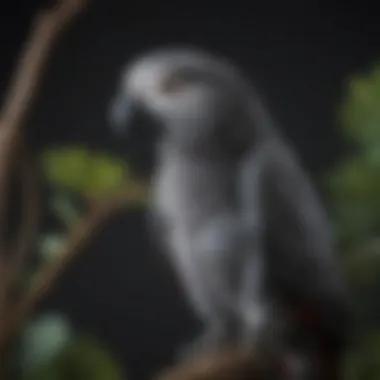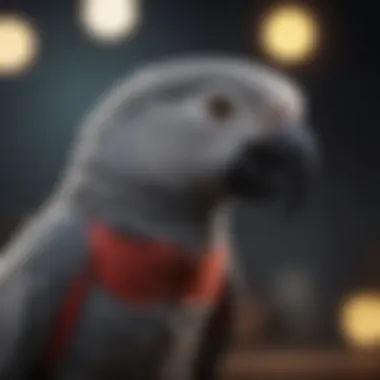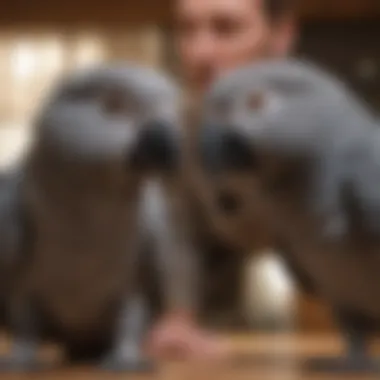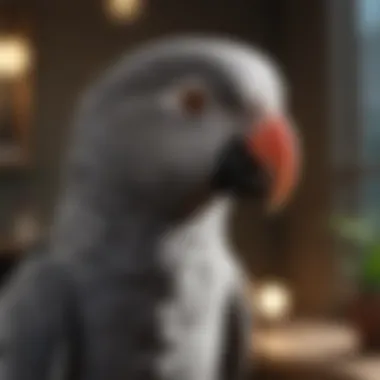Understanding the Financial Commitment of African Grey Parrots


Intro
Owning an African Grey Parrot can be a rewarding experience, but it comes with unique costs and responsibilities. These intelligent birds require not only financial investment but also emotional commitment. This article delves into various aspects of ownership, providing detailed analysis on the costs incurred at each stage, from initial purchase to ongoing care.
In the following sections, we will explore key factors such as purchase expenses related to different ages and breeding types, essential supplies, routine health considerations, and potential hidden costs. The aim is to equip prospective owners with nuanced insights that assist in making informed decisions. Understanding these facets will foster responsible ownership and enhance the human-bird relationship.
Care Tips
Owning an African Grey requires a personal commitment to their care needs. Understanding day-to-day routines and specific requirements is paramount for a happy life for both the bird and the owner.
Daily Care Routines
Establishing a daily care routine ensures that the bird feels secure and comfortable. Typical routines include:
- Morning feeding with fresh fruits and pellets.
- Social interaction, as these birds thrive on companionship.
- 15-30 minutes of targeted training time to foster learning and bonding.
- Evening perch time with safety checks before covering the cage for the night.
Cage Setup and Maintenance
A well-designed cage pays dividends in terms of mental stimulation and overall well-being. Consider the following:
- Cage dimensions: Minimum of 24" x 36" x 48" for an African Grey.
- Stock it with various perches, toys, and activities.
- Monthly cleaning involves replacing bedding and removing old food.
Hygiene and Cleaning Practices
Maintaining cleanliness is crucial to avoid illness. Ensure you:
- Wipe down surfaces daily with pet-safe cleaning solutions.
- Use a vacuum designed specifically for pet owners to reduce dander.
Seasonal Care Adjustments
Changing seasons can affect an African Grey's environment. Adapting necessary elements will help:
- Provide extra warmth in cold weather, perhaps with a heated perch.
- Increase hydration and moisture to combat dry air.
Prelude
Understanding the costs associated with owning an African Grey Parrot is essential for anyone considering incorporating this intelligent bird into their life. African Greys are known for their remarkable cognitive abilities and strong social bonds, but they come with significant responsibilities and financial commitments.
This article seeks to present a thorough breakdown of the expenses involved in caring for these parrots, from initial purchasing to long-term care. It will help potential pet owners make informed decisions.
Potential owners must be clear about the importance of each cost. Initial acquisition costs can vary greatly depending on where the bird is obtained, while ongoing care expenses add up quickly. Understanding these factors allows future owners to set realistic budgets and avoid unexpected financial burdens. Moreover, specific details regarding health care, nutrition, and supplies play a crucial role in the care and well-being of these birds, ensuring they remain healthy and satisfied throughout their lives.
Clearly articulating the potential costs also emphasizes the necessity of responsible ownership. African Grey Parrots are not simple pets; they require committed attention, specialized care, and monitoring for health issues. Highlighting these responsibilities and costs sets the stage for a complete understanding of what pet ownership entails.
This introduction will pave the way for a deeper exploration of relevant financial elements, shedding light on hidden costs. Not only will this equip aspiring bird owners with information, but it will also pave the way for a harmonious relationship between the owner and their African Grey.
Overview of African Grey Parrots
Understanding the African Grey parrot is a vital starting point for potential owners. Known for their remarkable intelligence and sociability, these birds possess characteristics that are enviable yet require serious consideration. This section will outline key traits and behaviors that make these parrots distinct, shedding light on what prospective owners should anticipate.
Description and Characteristics
The African Grey parrot is most admired for its striking features and sophisticated behaviors. They have a predominant grey plumage, with facial markings including a white and black mask, often regarded as having a dignified appearance. They tend to grow to about 12 to 14 inches in length, which is a moderate size for a pet bird. Furthermore, they possess a long tail that is often a vibrant shade of red or maroon, setting them apart visually from other parrot types.
Apart from their looks, these parrots are iknown for their longevity, with a lifespan that can reach up to 50 years or more if properly cared for. Such lifespan indicates committment. Their adaptability to various environments shows they can live comfortably in both sizeable aviaries and regular homes as long as their physical needs are met. However, their smarter nature requires ample mental stimulation to prevent boredom and, subsequently, behavioral issues.


Behavior and Intelligence
These birds are renowned for their extraordinary intelligence. What makes the African Grey parrot truly stand out is their ability to mimic human speech and sounds. Studies have indicated these birds can learn and recognize more than 100 words and phrases. This vocal skill is not merely amusing; it serves as a core connection to their social nature.
Additionally, African Greys actively seek interaction, making them remarkably engaging pets. However, their intelligence means they can become bored easily, leading to destructive behaviors if kept in isolation without proper entertainment. Their need for regular interaction means that owners must dedicate time to engage their birds through play and socializing. This bond is crucial to the mental well-being of the parrot.
“Intelligent creatures require constant mental stimulation or they may engage in unwanted behaviors.”
Initial Purchase Costs
Understanding the initial purchase costs involved in owning an African Grey Parrot is crucial for prospective bird owners. This section provides insight into the financial commitments necessary to acquire one of these intelligent and enchanting birds. Initial costs can vary widely based on several factors including the source of purchase, age of the parrot, and regional pricing. Hence, it is important to deliberate all aspects to plan effectively.
Buying from a Breeder vs.
Pet Store
When considering where to buy an African Grey Parrot, two popular options surface: breeders and pet stores. Buying from a breeder often provides potential owners with enhanced benefits such as reliable background information and detailed insights into the parrot's lineage and health. Breeders frequently invest more time and effort in raising birds that are well-socialized and trained. They are also likely to offer guidance on parrot care, which could prove invaluable over the early months of ownership.
On the other side, pet stores may present initial appeal due to their convenience. They can stock a variety of breeds and age ranges, potentially offering lower immediate costs. However, capturing complete information on the bird’s history or previous care can be challenging. Birds from pet stores may be less socialized and this could result in the need for additional time and resources to adjust their behavior.
In summary, it becomes essential to investigate the pros and cons of each option carefully before making a choice to ensure a healthy transition for a new pet.
Rehoming or Adoption Fees
The route of rehoming or adopting an African Grey Parrot can lower initial costs significantly. Many birds in need of new homes come from individuals who can no longer care for them, while others may come through rescue organizations seeking owners for birds that need love and care. Adoption fees may range from nominal amounts to more elaborate fees, depending generally on the organization and the bird's specific circumstances. Aside from helping an animal in need, the benefits of rehoming also include inheriting a parrot with previous training and established routines.
But remember, when adopting, consider the background of the bird. Smooth transitions may require understanding their past behavior or requirements, so becoming familiar with their individual needs is essential.
Factors Influencing Price Variations
Several elements can significantly influence the price of an African Grey Parrot, warranting investigation.
Age of the Parrot
Age plays a vital role in the pricing of these birds. Younger parrots tend to have higher costs, given their potential for bonding and training. In this scenario, buyers have the opportunity to shape the bird's social skills from a young age, something that many people find appealing. Conversely, older parrots might be priced lower due to concerns surrounding their long-term lifespans or about owners looking for immediate companionship without a lengthy caretaking process.
Breeding Quality
Breeding quality can sharply affect how much an African Grey costs. Parrots bred under stringent breeding guidelines tend to be healthier, possess fewer genetic deformities, and often exhibit better temperaments. High-quality breeding practices can demand a premium price. Nevertheless, investing in a well-bred parrot usually pays off long-term through a healthier and happier bird. Conversely, cheaper options may lead to unexpectedly high veterinary costs later, as underlying issues emerge or issues arise connected to the genetics of the bird.
Location
Location can also influence buying prices for African Grey Parrots. Cities with a concentration of breeders often have competitive pricing borne by multiple players in the market. In contrast, rural areas may have limited options, resulting in elevated prices due to scarcity. Prospective owners should also factor in expenses like transportation.
In summary, learning about these fundamental factors can shape decision-making significantly and prepare future parrot owners for their commitments.
Ongoing Care Costs
Understanding the ongoing care costs of owning an African Grey Parrot is crucial for prospective owners. This section covers various aspects, including dietary needs, supplies, grooming, and maintenance. These expenses can accumulate over time, creating a significant annual or monthly budget requirement. Failure to recognize these costs can lead to financial burdens and may affect the quality of care the bird receives.
Food and Nutrition Requirements
Proper food and nutrition is fundamental for the health of African Grey Parrots. These birds require a well-balanced diet to thrive and avoid health complications. A primary component of their diet should be formulated pellets, which provide essential vitamins and minerals tailored for these birds. Additionally, offering fresh fruits and vegetables is vital for hydration and enrichment. Typical food options might include carrots, apples, and leafy greens.
An effective diet often involves several elements. Understanding nutritional needs can prevent issues like malnutrition or obesity, which directly impact their lifespan and quality of life. A mindful feeding routine also serves to bond the owner and the parrot, enhancing social interaction and learning.


Routine Supplies
Cage and Accessories
A suitable cage is among the most essential aspects of owning an African Grey Parrot. The size and design facilitate healthy living conditions. Ideally, the cage should allow ample space for movement, perching, and even minimal flight. Height is particularly critical. The interior should include perches made from safe, non-toxic materials.
Many owners may opt for cages that allow for flexibility and customization. This feature makes cleaning and organization easier. Traders provide various designs, even with sliding drawers for droppings. This adaptation saves time and maintains hygiene. A firmly built cage ensures the safety of the parrot especially when they exercise or play.
Toys and Enrichment Materials
Providing toys is another vital dimension of care. Toys and enrichment materials help maintain an African Grey Parrot's mental health. These items foster natural behaviors and offer stimulation that can prevent boredom or anxiety. Chewing toys, bells, and puzzles promote engagement and fortitude.
Choosing toys with various textures and functions is critical. Birds need to explore different materials, understanding softness versus hardness. While some toys might be durable, others can be more destructible, reflecting personal preferences and tendencies. Discarding old or broken toys prevents injury and invites new interactions. This rotation of fresh items can also mitigate stress and over-stimulation, hence creating a sustainable play environment.
Grooming and Maintenance Expenses
Grooming is a component often understated concerning ongoing costs. African Grey Parrots require regular beak and nail trimming, which might occasionally need professional assistance. Keeping their feathers clean is conducive to their comfort.
Maintaining hygiene is essential for all pets but especially for birds, as they can be prone to various substratum-related health issues. While tools such as regular bathing can sometimes be managed at home, a budget should include potential visits to grooming specialists on an as-needed basis.
These ongoing care costs add to the overall commitment of responsible pet ownership. By understanding daily, monthly, and annual expenses, future owners can prepare effectively and ensure their African Grey Parrots live healthy and fulfilling lives.
Healthcare Costs
Understanding healthcare costs is essential for anyone considering bringing an African Grey Parrot into their home. These costs are often more than just the purchase price. Medical care is vital for a parrot's longevity and overall quality of life. Many owners may underestimate how these ongoing financial obligations can accumulate over time. Addressing healthcare concerns early maximizes the bird’s lifespan and reduces expenses that could arise from untreated problems. This section details various aspects of veterinary care and preventive measures to give potential owners a clear picture of what to expect.
Veterinary Care and Average Fees
Veterinary care forms a backbone for maintaining the health of your African Grey Parrot. Understanding fees associated with routine visits and issue-specific checks is vital.
Routine Check-ups
Routine check-ups are critical for early detection of health issues. During these visits, veterinarians assess the overall health of your parrot. This proactive measure helps identify potential problems before they escalate. The cost usually ranges depending on the vet’s expertise and your location.
The unique feature of routine check-ups lies in their preventive nature. They serve as regular health audits for your bird. Benefits of these visits often include:
- Basic health assessments
- Weight monitoring
- Screening for parasites
Moreover, ensuring routine visits builds familiarity between your pet and the veterinarian which is beneficial.
On the other hand, some owners may neglect these visits thinking their parrot appears healthy. This could lead to higher expense from later treatments for undetected issues. Generally, making routine check-ups a part of your pet care budget minimizes unexpected expenditures.
Sick Visits
Sick visits arise when a parrot shows signs of illness, making them distinctly different from routine check-ups. These visits usually happen when something seems wrong and require immediate attention. It is important to consult a vet promptly to avoid minor issues developing into serious complications.
These visits typically cater specifically to medical conditions or symptoms the bird exhibits. The common characteristic of sick visits is they often carry a higher cost compared to routine assessments. Owners tend to appreciate the urgency surrounding sick visits.
While they address immediate health risks, they also often represent a more significant financial strain if the health concern is severe. Some drawbacks include:
- Costs increase if tests or treatments are required
- Potential for multiple follow-up visits
Recognizing the distinction in costs is key for budgeting carefully in advance.
Potential Medical Conditions


Understanding potential medical conditions affecting African Grey Parrots can save money in both care and reassurance. Common issues include:
- Psittacosis
- Feather plucking
- Liver disease
Age, genetics, and environmental setup can all contribute to these issues. Many of these conditions might not show symptoms until they become severe, thereby leading to higher veterinary costs if you do not schedule regular appointments. Being informed empowers owners to take necessary precautions for the health of their parrots.
Preventive Care Measures
Consider preventive care measures as all-encompassing. They include nutritional guidance, regular fitness, and indicating safe habitats. Nutritional environments improve immunity making your African Grey Parrot less susceptible to many health issues. Ensuring toys are functional and safe may also keep engagement high and destructive behaviors low.
Consistent preventive practices cost less than dealing with chronic issues turned acute. Simple routines often include:
- Regular cleaning of living space
- A varied, healthy diet tailored for birds
- Mental stimulation through toys and social interactions
The importance of preventive care cannot be overlooked. By investing in proper care before problems arise, individuals can enjoy a happier and healthier pet without excessive financial burdens.
Long-term Financial Considerations
When contemplating the ownership of an African Grey Parrot, it is essential to address long-term financial considerations. This mirrors crucial planning for a responsible commitment. Not only does the initial cost encompass the purchase of the parrot itself, but ongoing expenses compound significantly over its lifespan. African Grey Parrots can live for 40 years or more, mundane expenses can fluctuate amid inflation and changing prices within the pet industry, often resulting in unexpected financial strain.
Understanding long-term costs allows future parrot owners to new about financial planning and freedom.
Estimating Total Yearly Costs
Calculating estimated yearly costs involves looking at various factors. These expenses calculate food, supplies, healthcare, and any mix of enrichment needs that go beyond monthly budgeting. Consider items listed below:
- Food and Nutrition: High-quality bird pellets, supplements, and fresh fruits and vegetables contribute significantly to the cost.
- Routine Supplies: This includes the cost of maintaining a proper cage, along with perches and other accessories, plus the expense of frequently changing toys to keep the parrot mentally stimulated.
- Healthcare: Regular vet visits, emergency care, and potential specialized treatment.
- Insurance: Depending on personal value viewed within bird ownership, some facilities provide healthcare policies available for added security.
Overall, viable estimates should generally range from $1,000 to $2,500 annually, though these could vary according to individual approaches.
Budgeting for Unexpected Expenses
Budgets often need elasticity due to the unexpected. With pet ownership, there does exist a chance of incidentals. Budgeting specifically for unforeseen expenses ensures that parrot owners have plans for emergencies. Some useful tips include:
- Creating an Emergency Fund: Saving 10-15% of average yearly expenses can establish peace of mind against potential issues.
- Keeping funds specifically for Veterinary Visits: Routine healthcare may occasionally require more intensive care, so savings assignation welcomes vital insurance coverage.
- Investing time in continuous education about advancing healthcare costs ensures timely financial coping whenever factors like rising vet fees approach.
Closure
Understanding the financial commitment involved with having an African Grey Parrot entails addressing multiple aspects:
- Initial expenses such as purchasing from a breeder or pet store must be weighed against these birds’ long-term value in companionship and intelligence.
- Ongoing care costs are substantial, covering food, nutrition, molecular treats, which directly impact the bird's health and demeanor. Routine purchases include cages, toys, and supplements, which become part of your every month routine.
- Healthcare considerations are an important part. Regular veterinary visits and potential medical emergencies can result in significant expense. Knowing common health issues may arise helps expect future costs.
Thus, informed financial planning assures that a prospective owner does not overlook essential considerations. Analyzing your budget in advance and preparing for unexpected expenses shows responsibility. It lays the groundwork for deeper understanding regarding both the joys and responsibilities involved in pet ownership.
Moreover, this article provides an extensive exploration of resources available to support future owners, outlining guidelines around reputable places to acquire birds and necessary veterinary contacts. Adding a parrot like this to the home should be seen as a thoughtful and deliberate decision, rather than an impulsive one.
In sum, the stakes involved in home care prioritize not just providing a comfortable space for the bird but ensuring a thriving environment rooted in well-planned resources. Recognizing these factors puts one in position to enjoy all the benefits of companionship with beautiful and intelligent African Grey Parrots, making each day a chance for further richness in one’s life.
Further Reading and Resources
Exploring the costs associated with owning an African Grey Parrot involves understanding greater context and information. Further light can be shed on various aspects through detailed reading and utilizing rich resources, which helps prospective owners be fully prepared for their commitment.
There are numerous platforms and sources where valuable information can be found. These resources delve into both the financial aspects and the ethical considerations of pet bird ownership. The following are some key elements important to consider:
- Species Information: Books and articles focusing on African Grey Parrots provide insight into their natural habitat and social behavior, important for understanding their needs.
- Cost Studies: Pet industry reports and studies often outline average ownership costs, enriching the data presented in this article.
- Health Guides: Resources that detail common health issues faced by African Grey Parrots and preventive measure type care can offer awareness and save expense.
- Community Support: Online forums, such as those on Reddit, connect current and future owners, offering first-hand experiences and adivice that can't be found in books.
- Veterinary Networks: Compiling a list of avian veterinarians through resources can ensure easy access to professional support, maintaining the health of the parrot.
By utilizing these further readings and resources, prospective parrot owners can arm themselves with the knowledge necessary for making informed decisions. They not only highlight financial responsibilities but also underscore the nuanced caring required for African Grey Parrots.
"Pet ownership is as much about mental preparation as it is about financial readiness."
Utilizing these resources allows individuals to adopt a holistically responsible approach when planning for parrot ownership, ensuring they consider every potential aspect. From micro-level contributions like quality toys to macro-management concerning vet care costs, every detail can influence the entire ownership experience. Investing time in thorough knowledge reduces risk and enriches the relationship between bird and owner, ensuring it is both fulfilling and beneficial.
For more enriching content, consider exploring informative articles on sites like Wikipedia, Britannica, or joining discussions on Reddit and Facebook.















